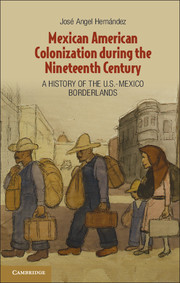 Mexican American Colonization during the Nineteenth Century
Mexican American Colonization during the Nineteenth Century Book contents
- Frontmatter
- Contents
- Figures
- Acknowledgments
- Introduction
- Part I Migration to Mexico in an Age of Global Immigrations
- Chapter One From Conquest to Colonization
- Chapter Two Postwar Expulsions and Early Repatriation Policy
- Part II México Perdido and the Making of Postwar Repatriation Programs Along the Borderlands
- Chapter Three Postwar Repatriation and Settling the Frontiers of New Mexico
- Chapter Four Repatriations Along the International Boundary
- Part III The Local Mixing, Unmixing, and Remixing of a Repatriate Colony in Chihuahua
- Chapter Five The 1871 Riot of La Mesilla, New Mexico
- Chapter Six Colonizing La Ascensión, Chihuahua
- Chapter Seven Anatomy of The 1892 Revolt of La Ascensión, or the Public Lynching of Rafael Ancheta
- Conclusion Repatriating Modernity?
- Bibliography
- Index
- References
Chapter One - From Conquest to Colonization
The Making of Mexican Colonization Policy After Independence
Published online by Cambridge University Press: 05 June 2012
- Frontmatter
- Contents
- Figures
- Acknowledgments
- Introduction
- Part I Migration to Mexico in an Age of Global Immigrations
- Chapter One From Conquest to Colonization
- Chapter Two Postwar Expulsions and Early Repatriation Policy
- Part II México Perdido and the Making of Postwar Repatriation Programs Along the Borderlands
- Chapter Three Postwar Repatriation and Settling the Frontiers of New Mexico
- Chapter Four Repatriations Along the International Boundary
- Part III The Local Mixing, Unmixing, and Remixing of a Repatriate Colony in Chihuahua
- Chapter Five The 1871 Riot of La Mesilla, New Mexico
- Chapter Six Colonizing La Ascensión, Chihuahua
- Chapter Seven Anatomy of The 1892 Revolt of La Ascensión, or the Public Lynching of Rafael Ancheta
- Conclusion Repatriating Modernity?
- Bibliography
- Index
- References
Summary
This first chapter examines how the demographic and strategic position of Indios Bárbaros, immigrants, migrant Indians, and Mexicans north of the Rio Grande influenced the direction and ultimate implementation of immigration-cum-colonization policies after Mexican independence. Many intellectuals of the era argued that one of the primary reasons for dramatic U.S. economic growth and aggressive westward expansion was the arrival of European immigrants – a global phenomenon on which Mexico also sought to capitalize. But, unlike its neighbors, Mexico received few of these immigrants because of restrictive policies influenced by botched colonization schemes, lower wages, three Spanish expulsions, and religious intolerance against non-Catholics. Mexican colonization policy fluctuated between inclusion and exclusion, but ultimately these early trials and tribulations became the basis for a series of laws that would ultimately give preferential treatment to Mexicans willing to settle and colonize the frontiers of the Republic.
These conclusions contradict a view in the immigration and colonization historiography that suggests these policies were implemented solely to “whiten” the populations like those in the United States, Argentina, or Brazil. Aside from emerging in a period that witnessed the movement of millions of people across the globe, Mexico’s immigration policies emerged in large part as a way to incorporate the majority of the indigenous populace into the larger “Mexican family,” but also as a way to “Mexicanize” communities outside of state control like those residing on the frontiers of Tejas, Alta California, and Nuevo Mexico. The botched colonization project of Stephen F. Austin in Texas in the early 1820s – a project that set in motion the confrontation between Mexico and the United States in 1846 – forever altered not only the politics of colonization in Mexico, but the very way in which Mexican national identity was imagined. Populations along the newly independent nation’s frontiers, many of whom had been neglected for generations under the Spanish Empire, were now being courted to thwart European and Euro American immigrants making their way toward Texas and the frontiers of the two republics.
- Type
- Chapter
- Information
- Mexican American Colonization during the Nineteenth CenturyA History of the U.S.-Mexico Borderlands, pp. 25 - 66Publisher: Cambridge University PressPrint publication year: 2012


